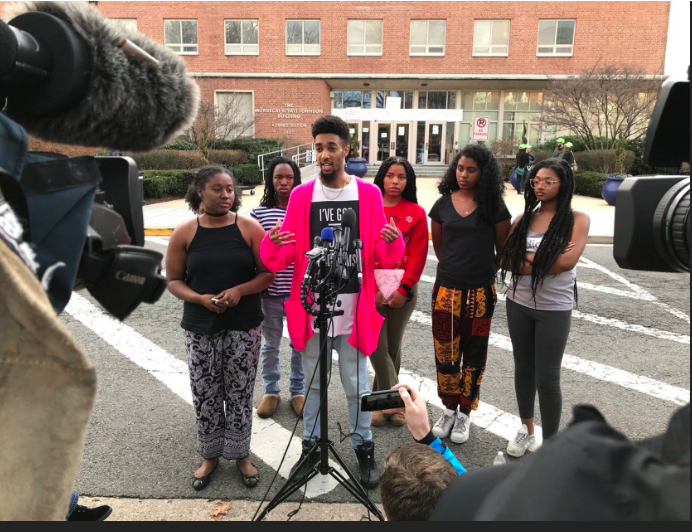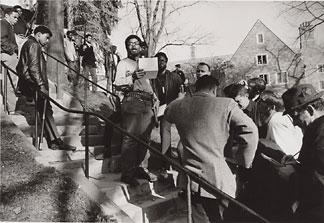
April 6, 2018: HU Resist activists Alexis McKenny (left) and Juan Demetrixx address the media in front of Howard Administrative Building. (WTOP/Michelle Basch)
Last week, after 9 days of sit-ins and deliberations, student protesters reached a settlement with the Howard University Board of Trustees in the form of a Statement of Commitments. The sit-ins broke the record for the longest Howard University student protest and harked back to historic campus takeovers by black student activists in the 1960s.

April 20, 1969: Cornell Afro-American Society Student leader Eric Evans reads a statement following takeover of Willard Straight Hall (Cornell University Division of Rare and Manuscript Collections)
Led by the student group HU Resist, protesters entered the Howard administration building on March 29 with a list of 9 demands, including stronger protections against sexual assault, disarming campus police, freezing undergraduate tuition rates and improving food and housing security for students under 21.
Originally, the student activists also demanded university President Wayne Frederick’s resignation. But eight days into the negotiations, students withdrew their resignation demand, choosing instead to focus their resistance efforts “around the overall improvement of (Howard University) instead of the elimination of one figure.” The following day, deliberations ended and students jubilated in the success of their activism.
“This is a long time coming,” said HU Resist leader Alexis McKenny. “It’s important for us to acknowledge that no significant change that has ever happened within the black community has happened without struggle.”
Students cheering as the leaders return from the meeting with signed negotiations pic.twitter.com/dWdrTUkllQ
— Kyra E. Azore (@KyraAzore) April 6, 2018
Among the demands the Board finally agreed to were:
- Instituting a student-appointed ombudsperson who will report to the Vice President for Student Affairs and actively participate in Student Life and Affairs Committee meetings;
- Regular forums where students can convey campus life concerns to the Board;
- A student-administrator task force, co-chaired by a student, to study existing grievance mechanisms as well as best practices at other universities and propose changes that strengthen behavioral accountability for faculty, administrators and students.
NCAC applauds HUResist and Howard student protesters for their inspiring civic activism and for using the First Amendment as an instrument for positive, community-centered change.
HU student Alexis McKenney says #HowardUniversity’s Admin Building is back open. The sit in is over. She’s thanking students for their support. (@wusa9) pic.twitter.com/sIQDlit7Bi
— John Henry (@JohnHenryWUSA) April 6, 2018


